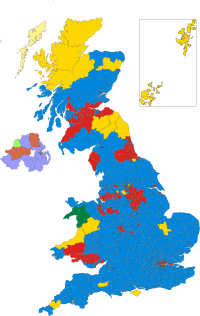Landslide victory
A landslide victory is an electoral victory in a political system, when one candidate or party receives an overwhelming supermajority of the votes or seats in the elected body, thus utterly eliminating the opponents. The winning party has reached more voters than usual, and a landslide victory is often seen in hindsight as a turning point in people's views on political matters.
Part of the reason for a landslide victory is sometimes a bandwagon effect, as a significant number of people may decide to vote for the party which is in the lead in the pre-election opinion polls, regardless of its politics.
The term is borrowed from geology, where a landslide takes almost everything with it on its way.
In a deliberative assembly, votes that are expected to be landslides in one direction or another are typically decided by voice vote.
Contents
1 United Kingdom
1.1 Scotland
2 See also
3 References
United Kingdom

The electoral map of the United Kingdom following the 1983 general election, resulting in a 148-seat majority for the Conservative Party.
Since the end of the second World War, there have been a number of elections that the media has described as being won by a landslide.
1945 – Clement Attlee's Labour Party defeated Wartime Prime Minister Winston Churchill's Conservative Party, winning a majority of 146 seats. Labour obtained 47.7% of the vote, 11.5% more than the opposing Conservatives. The 12% national swing in this election from the Conservatives to Labour remains the largest ever achieved in a British general election.[1]
1959 – Harold Macmillan took the Conservatives to a third successive election victory, winning a 102-seat majority on 49.4% of the vote – the highest share of the vote for any party in the UK since the end of World War II.[2]
1966 – Labour won a 96-seat majority under Harold Wilson with 48% of the vote.[2]
1979 – The Conservative Party entered into Government under the leadership of Margaret Thatcher on a 5.2% swing – the largest since 1945.[3]
1983 – Margaret Thatcher led the Conservative Party to a second successive victory over Labour, with a Parliamentary majority of 144. The Conservatives lead Labour by 14.8% of the vote.[4]
1987 – The Conservatives were returned with a 102-seat majority, giving Margaret Thatcher a third term in power.[5]
1997 – Labour returned to power for the first time in eighteen years under Tony Blair with a 179-seat majority. The party won 418 seats, the highest for any party since 1931. The incumbent Conservatives won their lowest share of the vote since the 1832 election.[6]
2001 – The 2001 election saw much the same result as 1997, with only twenty-seven seats changing hands. The election has become known as the "quiet landslide" by some commentators.[7][8]
Scotland
2011 – The Scottish National Party (SNP) won the first majority under devolution, winning 69 seats. The party won 45.4% of the constituency vote and 44% of the regional list vote. The Scottish Parliamentary electoral system had been designed to prevent any one party from gaining a majority of seats.[9][10]
2015 – The SNP won 56 out of the 59 Scottish seats in the UK general election, winning half of the vote on a 24% swing nationwide.[11]
See also
- Wave elections in the United States
- Blowout (sports)
Landslide (board game)
References
^ "1945: Labour landslide buries Churchill". BBC. Retrieved 5 June 2018..mw-parser-output cite.citation{font-style:inherit}.mw-parser-output q{quotes:"""""""'""'"}.mw-parser-output code.cs1-code{color:inherit;background:inherit;border:inherit;padding:inherit}.mw-parser-output .cs1-lock-free a{background:url("//upload.wikimedia.org/wikipedia/commons/thumb/6/65/Lock-green.svg/9px-Lock-green.svg.png")no-repeat;background-position:right .1em center}.mw-parser-output .cs1-lock-limited a,.mw-parser-output .cs1-lock-registration a{background:url("//upload.wikimedia.org/wikipedia/commons/thumb/d/d6/Lock-gray-alt-2.svg/9px-Lock-gray-alt-2.svg.png")no-repeat;background-position:right .1em center}.mw-parser-output .cs1-lock-subscription a{background:url("//upload.wikimedia.org/wikipedia/commons/thumb/a/aa/Lock-red-alt-2.svg/9px-Lock-red-alt-2.svg.png")no-repeat;background-position:right .1em center}.mw-parser-output .cs1-subscription,.mw-parser-output .cs1-registration{color:#555}.mw-parser-output .cs1-subscription span,.mw-parser-output .cs1-registration span{border-bottom:1px dotted;cursor:help}.mw-parser-output .cs1-hidden-error{display:none;font-size:100%}.mw-parser-output .cs1-visible-error{font-size:100%}.mw-parser-output .cs1-subscription,.mw-parser-output .cs1-registration,.mw-parser-output .cs1-format{font-size:95%}.mw-parser-output .cs1-kern-left,.mw-parser-output .cs1-kern-wl-left{padding-left:0.2em}.mw-parser-output .cs1-kern-right,.mw-parser-output .cs1-kern-wl-right{padding-right:0.2em}
^ ab "7 biggest UK election landslides since 1945". hitc.com. Retrieved 5 June 2018.
^ "1979: Thatcher wins Tory landslide". BBC. 5 April 2005. Retrieved 5 June 2018.
^ "1983: Thatcher triumphs again". BBC. 5 April 2005. Retrieved 5 June 2018.
^ "1987: Thatcher wins record third term". BBC. Retrieved 5 June 2018.
^ "1997: Labour landslide ends Tory rule". BBC. 15 April 2005. Retrieved 5 June 2018.
^ "2001: Labour claims second term". BBC. 5 April 2005. Retrieved 5 June 2018.
^ "The rise and fall of New Labour". BBC News. 3 August 2010. Retrieved 5 June 2018.
^ "Stunning SNP election victory throws spotlight on Scottish independence". The Guardian. 6 May 2011. Retrieved 5 June 2018.
^ "SNP wins majority in Scottish elections". Channel 4. 6 May 2011. Retrieved 5 June 2018.
^ "Election 2015: SNP wins 56 of 59 seats in Scots landslide". BBC News. 8 May 2015. Retrieved 5 June 2018.